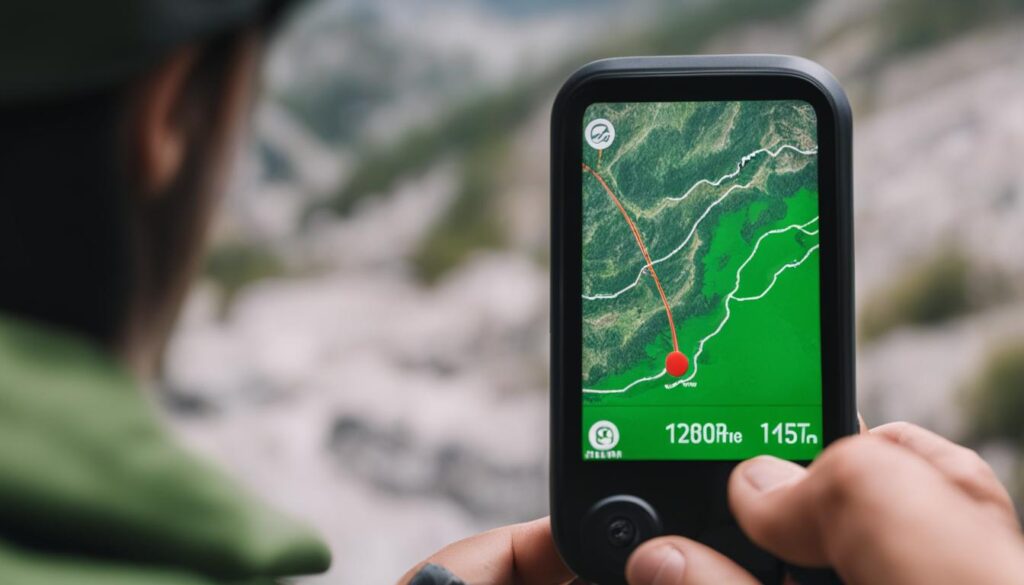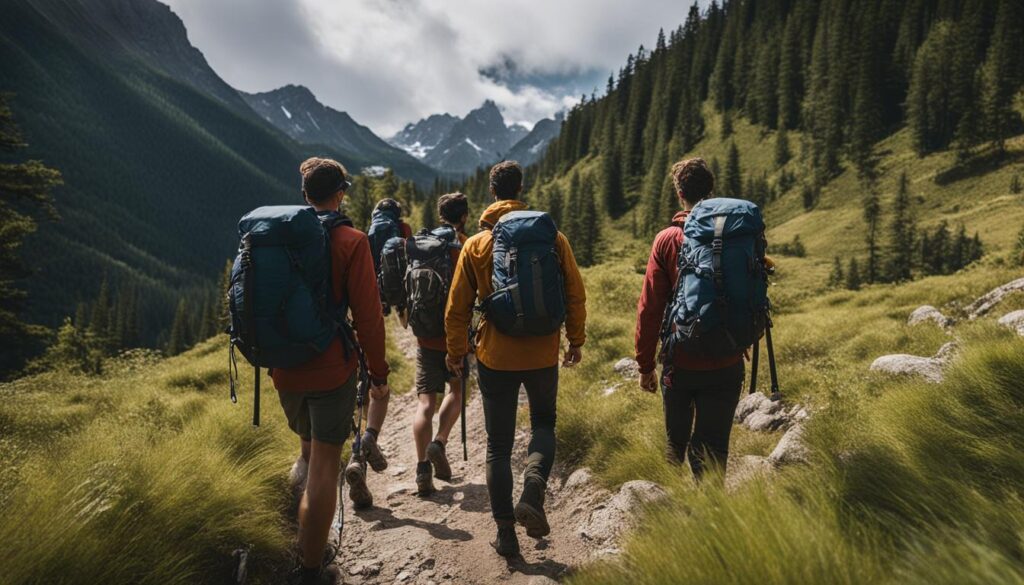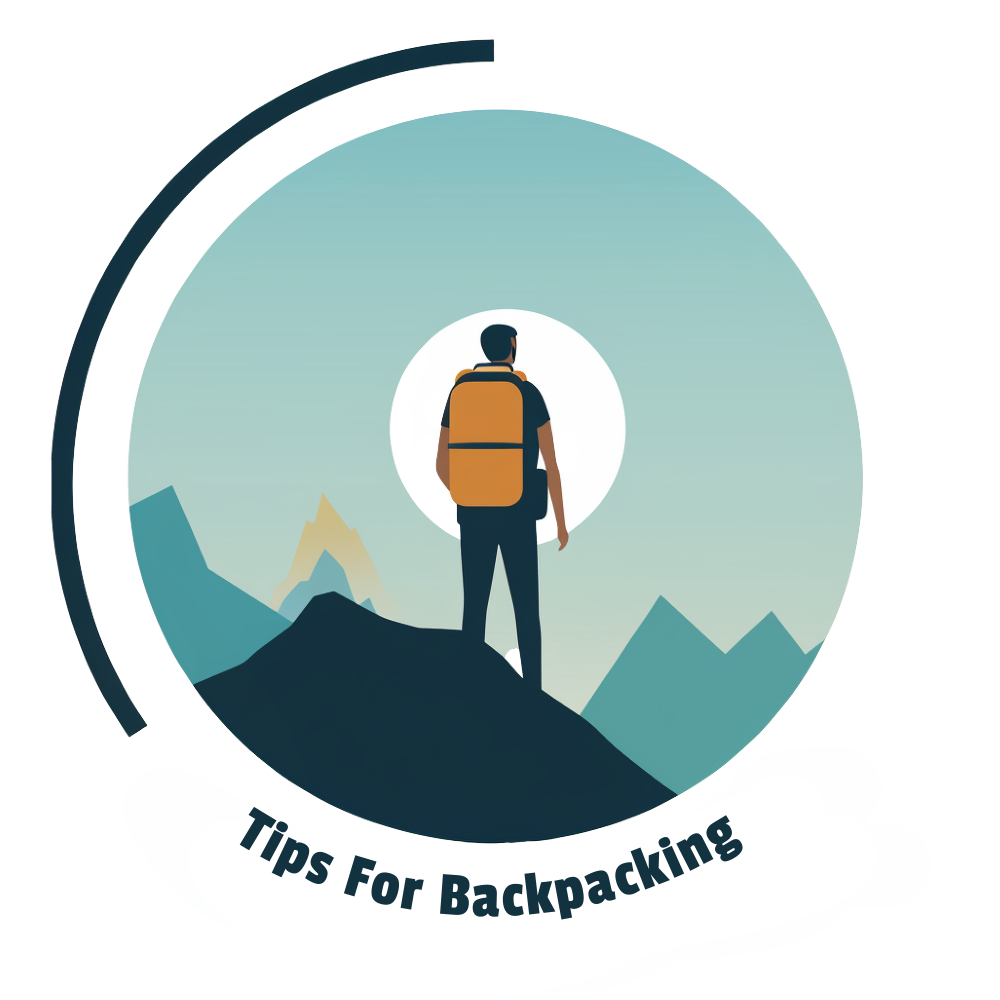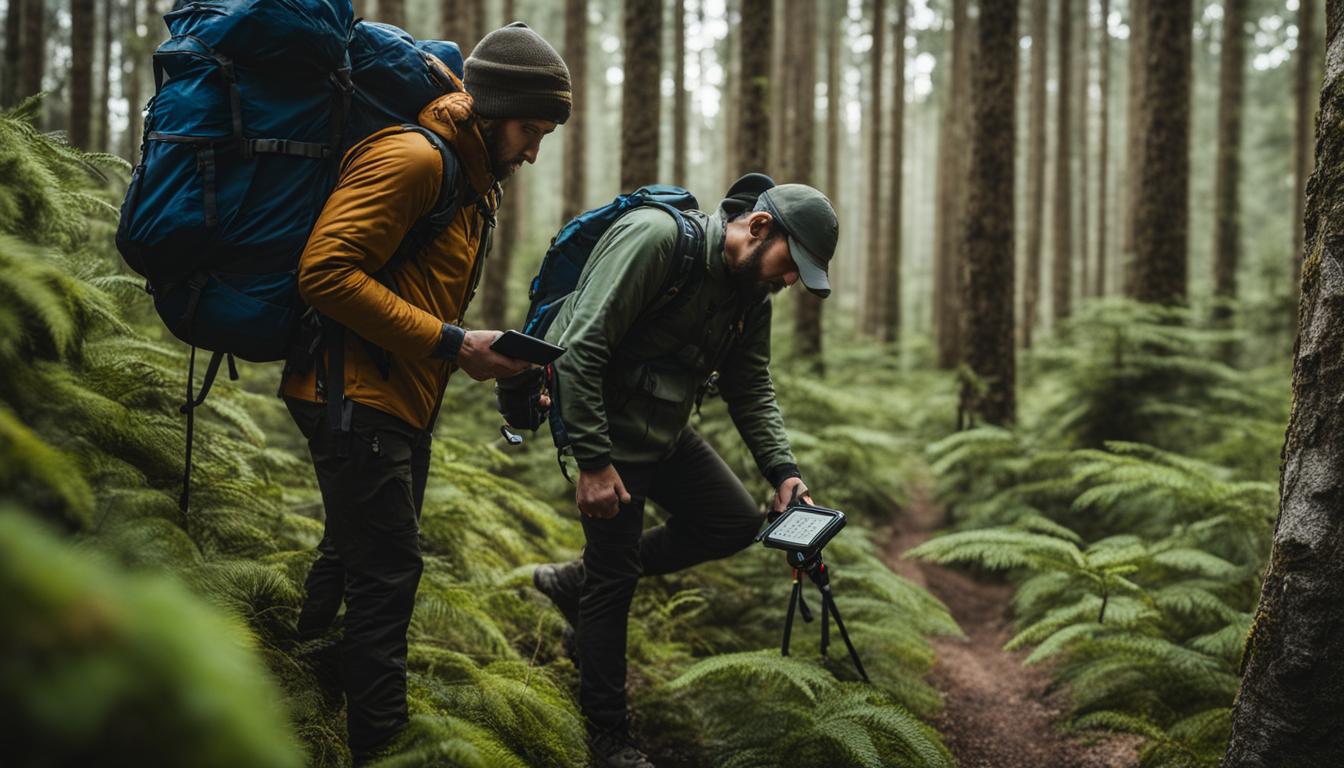As a backpacker, navigating the great outdoors is essential for a safe and successful adventure. By mastering basic GPS skills, you can confidently explore new terrain and discover hidden gems. In this article, I will share essential GPS navigation tips, outdoor GPS techniques, and backpacking navigation strategies to enhance your skills and make your backpacking trips even more enjoyable.
Key Takeaways:
- Understanding basic GPS skills is crucial for backpackers to navigate with confidence.
- Assembling the necessary tools, including maps, a compass, and a GPS device, is essential for successful navigation.
- Developing navigational skills requires hands-on experience and practice in different terrains.
- Balancing traditional navigation methods with GPS technology is important for maximum safety and effectiveness.
- By continuously expanding your navigational capabilities, you can become an expert backpacker navigator.
The Navigator’s Toolkit for Backpackers

When embarking on a hiking trip, having the right tools for navigation is crucial. The Navigator’s Toolkit is a collection of essential items that every backpacker should have to navigate confidently in the backcountry. Whether you’re a beginner hiker or an experienced outdoor enthusiast, these tools will help you make the most of your GPS device and ensure a successful backpacking experience.
Maps
Maps are the backbone of any navigation toolkit. It is important to have both overview maps and detailed maps of the areas you plan to explore. Overview maps provide a broad picture of the terrain and help you plan your route, while detailed maps provide more specific information about trails, landmarks, and topography. Having both paper and digital maps is recommended, as they offer different advantages. Paper maps are reliable and don’t require batteries, while digital maps can be easily accessed on a GPS watch or smartphone. Regardless of the format, make sure your maps are up-to-date and accurate.
Compass
A magnetic compass is an essential tool for orienting your map and finding bearings in the field. It helps you determine your direction of travel and navigate accurately, especially in areas with limited visibility or when your GPS device is unavailable. Make sure to learn how to read a compass and practice using it before your trip. A compass is a reliable backup tool that can save the day when technology fails.
GPS Device
A GPS watch or smartphone with GPS capabilities is a valuable tool for navigation. It provides accurate location data and can track your progress along the trail. GPS devices allow you to mark waypoints, track your route, and find your way back if you deviate from the planned path. However, it is important not to become overly reliant on GPS technology. Always carry a map and compass as backups and be prepared to navigate using traditional methods if needed.
Assembling the Navigator’s Toolkit with maps, a compass, and a GPS device, will empower you to confidently navigate the wilderness. By having these essential tools and knowing how to use them effectively, you can ensure a safe and enjoyable backpacking experience.
Developing Navigational Skills

Learning to navigate with GPS devices is an essential skill for outdoor adventurers. While it is possible to take a navigation course or watch tutorial videos to learn the basics, true expertise can only be gained through hands-on experience in the field. To develop navigational skills, it is recommended to start with easy-to-follow trails and gradually increase the difficulty of wilderness excursions.
When venturing into the backcountry, it is crucial to pay attention to your surroundings and keep your maps and compass easily accessible. Constantly correlating what you see on the map with the actual terrain helps reinforce your navigational understanding. GPS devices can be valuable tools for navigation, providing precise location data, but it is important not to become overly reliant on them. Striking a balance between traditional navigation methods and GPS technology ensures maximum safety and effectiveness.
Here are some tips for developing your navigational skills:
- Practice using GPS devices in various terrains and conditions
- Learn how to interpret topographic maps and understand contour lines
- Master the use of a compass for orienting the map and finding bearings
- Take note of prominent landmarks and features to aid in navigation
- Join hiking or backpacking groups to learn from experienced navigators
By honing your navigational skills, you’ll gain the confidence to embark on outdoor adventures with ease. Remember, practice makes perfect, so take every opportunity to navigate in different environments and challenging terrains.
Tips for Navigating with GPS
“Learning how to navigate with GPS can be a game-changer for outdoor enthusiasts. It provides accurate location data and makes it easier to track your progress along a route. However, it’s essential to familiarize yourself with the device and its functions before relying on it in the wilderness.”
When using GPS for navigation, here are some additional tips to keep in mind:
- Ensure your GPS device is fully charged and has a backup power source
- Download offline maps or have physical backup maps as a contingency
- Regularly update the software and firmware on your GPS device
- Learn how to set waypoints and navigate to them
- Practice using different navigation modes, such as trackback or route following
With time and experience, navigating with GPS will become second nature, allowing you to explore new trails and remote areas confidently. Remember, while technology can be a valuable tool, it’s essential to have a strong foundation in traditional navigational skills for added safety and reliability.
Are Basic GPS Skills Sufficient for Backpacking Navigation, or Are Additional Skills Required?
When it comes to backpacking navigation techniques, basic GPS skills can be helpful, but additional skills are often necessary for safe and successful navigation in the wilderness. Map reading, compass use, terrain assessment, and understanding natural signs are essential for any backpacking adventure.
Can I Use Basic GPS Skills to Navigate on Top Rated Backpacking Trails for Scenic Views?
Yes, you can definitely use basic GPS skills to explore stunning backpacking trails and navigate to scenic views. Many top-rated backpacking trails can be easily accessed and navigated with a simple GPS device, making it easier for hikers to find the most picturesque spots along the way.
Conclusion
As a backpacker, I’ve come to realize the importance of navigational skills in ensuring a safe and enjoyable outdoor adventure. Equipping yourself with the right tools, such as GPS devices for backpacking, and mastering essential navigational skills is crucial for becoming an expert navigator.
The Navigator’s Toolkit, consisting of maps, a magnetic compass, and a GPS watch or smartphone, provides the foundation for successful navigation. By familiarizing yourself with these tools and knowing how to use them effectively, you can confidently navigate through diverse terrains and unpredictable landscapes.
However, it’s important to remember that true expertise comes with experience. While GPS devices can be valuable assets, it’s essential to strike a balance between relying on technology and employing traditional navigation methods. Continually practicing and expanding your navigational capabilities will allow you to navigate with confidence, even in unfamiliar surroundings.
So whether you’re a beginner backpacker or a seasoned outdoor enthusiast, dedicating time and effort to developing essential navigational skills and utilizing GPS devices will enhance your backpacking experience. So go ahead, embark on incredible adventures, explore the wilderness, and become the expert navigator you aspire to be.

